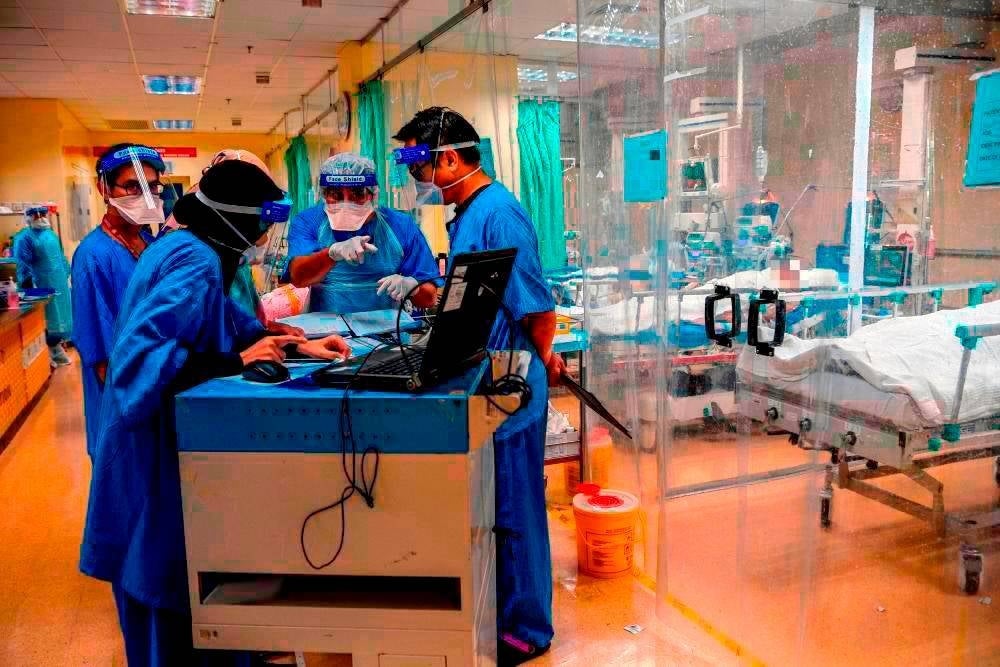Blood-thinning medication post delivery; a life-saving treatment
SITI NURSYAHIRAH MOHAMED ROSMAN
IT is well known that women face various complications after childbirth, including blood spills and blood clotting problems.
Blood clotting may result in death if treatment is not provided.
According to the Statistics Department Malaysia, "obstetric embolism," or blood clotting problems during pregnancy and after childbirth, were recorded as the leading cause of maternal death in 2020 with 18.8 per cent of cases, an increase of 6.2 per cent compared to the previous year.
Venous thromboembolism (VTE) occurs when a blood clot is formed in the vein and prevents blood flow in the body.
There are two types of VTE, namely ‘Deep Vein Thrombosis (DVT)’ and ‘Pulmonary Embolism (PE)’. DVT occurs when blood clots in the calves and pelvis, while PE occurs when blood clots break and travel to the lungs, thus affecting the lung’s function to effectively absorb oxygen.
Women who undergo caesarean delivery have higher risks of getting blood clots.
Other risk factors include obesity, smoking, and women with diseases that cause blood to become more concentrated, such as thrombophilia or protein S deficiency.
In addition to that, mothers who have surgery during pregnancy or postpartum, such as appendicitis surgery, mothers with high blood pressure during pregnancy and childbirth, mothers who experience severe vomiting during pregnancy, mothers pregnant with twins, and mothers who underwent a long delivery process (over 24 hours) also have higher risks of getting blood clots.
Hence, women need to be aware of the symptoms of blood clots in the early days after delivery, such as swelling of the legs or calves, difficulty breathing, chest pain, a cough with blood, or a high heart rate.
Do not hesitate to get treatment at a nearby hospital or clinic in the event of these signs.
Blood-thinning treatment
Some precautions that can be taken to prevent blood clots include drinking plenty of water to prevent dehydration, actively moving and walking, or wearing special stockings such as compression socks.
However, if these precautions are ineffective, doctors will recommend taking blood-thinning medications to prevent more serious complications.
Women with potential blood clots after childbirth will be given blood-thinning medications such as enoxaparin, heparin, or fondaparinux.
The choice of medication will be decided by the doctor according to the patient's indication and suitability.
Blood-thinning injections should be taken using the right methods and techniques. Here are some of the recommended steps:
1. Wash hands with soap and then dry.
2. Sit or lie down comfortably, and make sure the site of the injection can be seen. Patients can inject their own medicine on the stomach, thighs, or arms with the help of others.
3. Wipe the injection area with alcohol wipes.
4. Take the syringe and take off the lid.
5. Pinch the skin at the site of injection gently to ensure fatty areas are visible for injection. Make sure the needle is placed at a 90-degree angle with the injection site, then press the plunger until it is completely pressed down and wait for 10 seconds. Pull out the needle after the injection is complete.
6. Keep the medication as directed.
7. The injection should be taken at the same time every day according to the duration of treatment.
8. If the patient forgets to take the injection, do not double the dose.
9. In the event of a side effect of the medication, please tell the pharmacist or doctor and seek immediate treatment.
Keep in mind that proper injection techniques are important to ensure the effectiveness of this medication. The syringe should be disposed of properly to avoid injury. Collect used syringes in impenetrable containers such as cans or hard and thick plastic containers like detergent bottles and dispose of them safely.
Issues with porcine content in enoxaparin injection
The 87th Malaysian Islamic Religious Affairs Committee, held on June 23–25, 2009, has ruled that the use of drugs containing enoxaparin is prohibited as it is made from a non-halal source, which is porcine or pork. Currently, there is an alternative to Enoxaparin, which is Fondaparinux, that is made from halal sources and has the same function. However, there is no evidence of the effectiveness of fondaparinux drugs in pregnant or post-delivery (postpartum) women.
In addition, Enoxaparin is found to be safer than Fondaparinux for pregnant and breastfeeding mothers, including patients with kidney problems.
Enoxaparin is also found to be more effective than heparin. Enoxaparin can be used in Muslim patients after obtaining written permission from them before starting the treatment.
This is in line with "Panduan Penggunaan Ubat-ubatan yang Mengandungi Unsur Tidak Halal kepada Pesakit Muslim" in the Health Ministry.
Discuss with your doctor if a patient should take Enoxaparin injection in view of its benefits being greater than its harmful effects, especially during emergency conditions for the purpose of life-saving.
The patient's understanding of this matter is also very important to avoid any doubts and to ensure the patient's compliance in continuing the treatment.
If you have further questions regarding the use of medicines, patients or the public may contact the National Pharmacy Call Centre (NPCC) on the line 1800-88-6722, every Monday to Friday, from 8 am to 5 pm (except public holidays).
Prepared by Siti Nursyahirah Mohamed Rosman, Pegawai Farmasi UF44 at Hospital Cyberjaya.
Download Sinar Daily application.Click Here!














